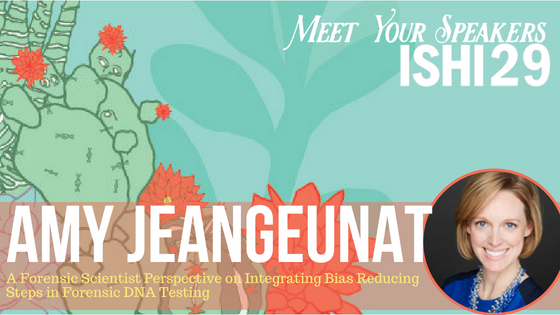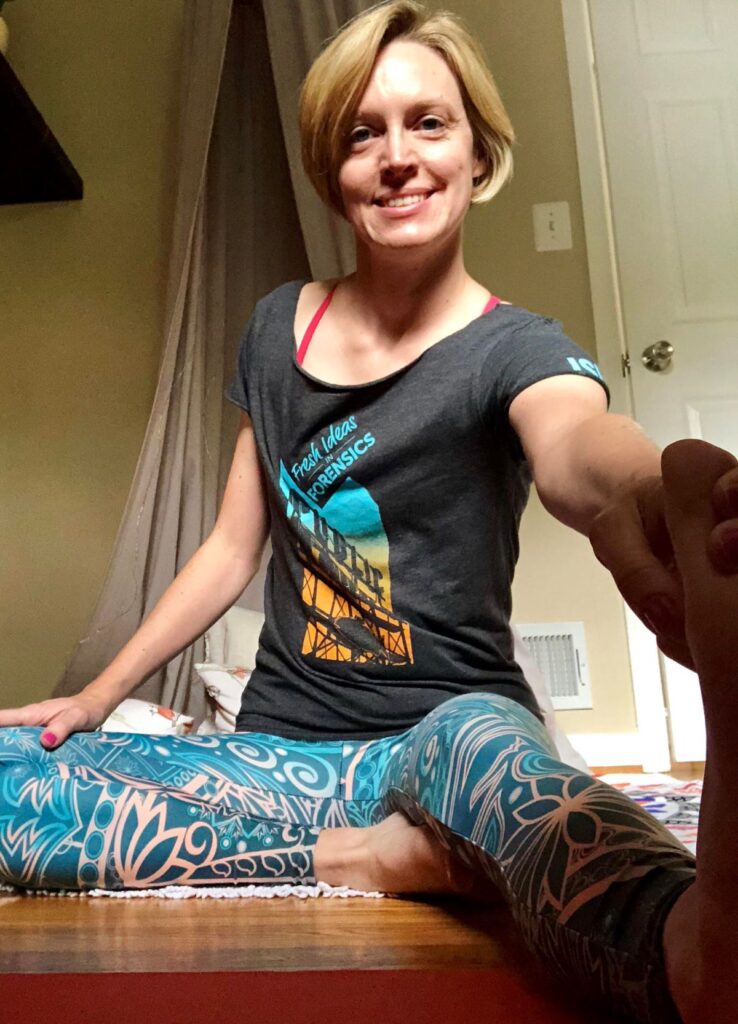Bias used to be a topic that was avoided in forensic science; it was dismissed and no one want to be labeled as having it. However, the acknowledgement that as human beings we have cognitive bias is now being embraced and being considered as part of considerations in workflow and performance in forensic testing.
In her presentation at ISHI, Amy Jeanguenat (Principle Consultant at Mindgen, LLC) will highlight cognitive bias that may arise in forensic DNA casework, examine areas that may have the largest return on implementing bias reducing steps, and provide the audience with confidence to have an active discussion in their laboratories on the influence of human factors in DNA testing.
We sat down with Amy and asked her when perceptions on bias started to change and to elaborate on the positive and negative outcomes of bias.
Hi Amy, thank you for talking with us today.
In your abstract, you mentioned that cognitive bias used to be a topic that was avoided but is now being embraced. When do you think that started to change and why?
Calling someone bias sounds like a negative four-letter word which creates defensive reactions and ultimately avoidance of the topic. When some of the original research in this area was coming out it was treated like an attack on forensics. The bigger picture seemed to be missed which is that our bias is a part of human nature. Therefore, while forensic scientists are bias so is the jury, the judge, the attorneys, etc. If we can remove the emotion and embrace the idea of bias, we can have more constructive discussions on what, if anything, to do about it.
I think it started to change when the U.S. the National Commission on Forensic Science and the Organization of Scientific Area Committees tried to create a collaborative effort between human factors experts and forensic experts. This has led to availability of training and more positive relationships between the two fields. The more we increase our awareness we can start to embrace change.
How are biases formed? Is it possible to fully ignore biases?
Bias is rooted in human nature; is impacted by environment, culture, and experience; and in forensics can extend to case specific information. Thus, it is not possible to completely ignore possible biasing information but, we can take steps to mitigate its effects.
Is it possible that positive outcomes could arise from biases?
Yes, even when exposed to bias, forensic scientists can and often do still make correct decisions. However, a risk assessment would help laboratories understand what steps lend a forensic scientist to being exposed to unnecessary bias which could lead to an incorrect decision.
Are there any negative consequences to an analyst trying to mitigate their biases?
Sure, there is an ebb and flow when it comes to having enough information to know what and where to test and being exposed to task irrelevant information. There are control of information procedures that have been advocated to reduce exposure to contextual information that may influence the forensic examiner. However, these need to be balanced against task relevant information needs to ensure quality of exams as well.
What types of training have been recommended to recognize and maybe even integrate bias into the forensic workflow?
Human factors training in cognitive bias has been recommended. I would like to see more trainings that are forensic discipline specific and demonstrate a collaboration between human factors and forensic experts.
Does an analyst have anything to worry about if they are called to testify and the topic of bias comes up?
The best thing the field can do is create transparency and understand the limits of the tests that were conducted. Laboratories that embrace training in cognitive bias, design a quality program that addresses human factors, and have taken steps to mitigate bias will finder it easier to discuss these topics in court and not be blindsided by this line of possible questioning.
As a former lab director, what do you feel is the biggest challenge that forensic laboratories are facing today?
Ugh- so many! Two bigger picture items that keep coming up for me is 1) how can the field embrace technology (faster) to allow DNA to inform an investigation rather than have results months later. There are so many tools to move forensic DNA testing along in this direction- rapid DNA, familial DNA searching, massively parallel sequencing, etc. I’d hate to see implementation take the next 10-20 years. 2) how can we establish better public/private partnerships in the areas of research and support of DNA testing. A lot of ‘rules’ make it harder than it needs to be. I’d like to see more productive discussions occurring to break down some of the existing barriers.
What tips would you give to someone who is just starting out in the forensics field, or what is the best advice that you’ve received?
In college a forensic professor told me to take finance along with my science courses. I found this to be good advice as the entire world (and your forensic lab) works on business principles. I extend this to tell inspiring forensic scientists to take classes in business, even explore the idea of an MBA. On top of technical education, you will need to know how to create budgets, track metrics, make hiring and firing decisions, invest in technology, etc.
For those still deciding whether to attend, what is your favorite thing about ISHI, or what are you most looking forward to this year?
ISHI has always been my favorite forensic DNA conference. The content provides me a fresh perspective on what is challenging and working in other forensic laboratories. If we work in a vacuum without getting out to external conferences that often leads to issues. I also like all the familiar faces- ISHI is where I can have personal face-to-face conversations with others in the industry too.
What’s one thing that others may not know about you?
The title of this presentation starts with ‘balancing effort and ease…’ this is also a philosophy I try to bring to my life. I like to challenge myself in new ways but with an awareness that I need to simplify in areas too (or moment by moment). One thing I am challenging myself with is completing a 200-hour registered yoga teacher training program which I hope to complete by ISHI 29. I will bring teachings from this certification into the resilience training I provide to forensic laboratories. The goal here is to provide tools so everyone has the choice to bloom in forensics; I might geek out a little bit when my forensic shirts match my yoga pants.
Thanks for talking with us Amy! If you’d like to see her speak in person, you can register for ISHI through the link above.
WOULD YOU LIKE TO SEE MORE ARTICLES LIKE THIS? SUBSCRIBE TO THE ISHI BLOG BELOW!
SUBSCRIBE NOW!



